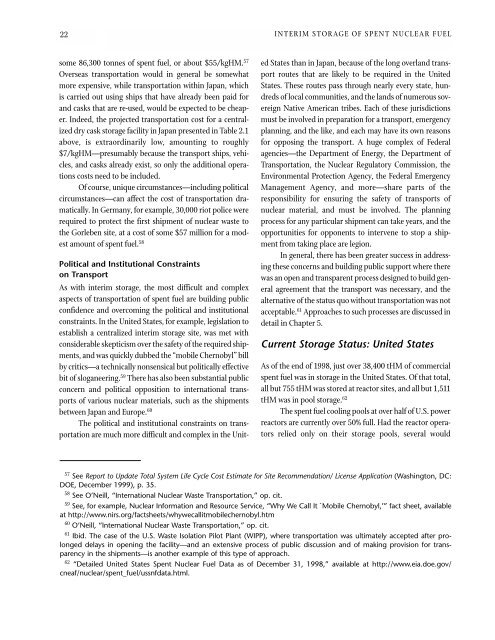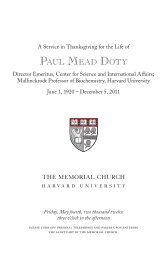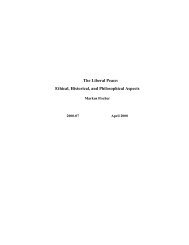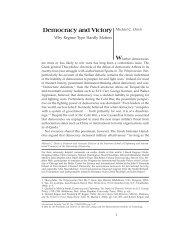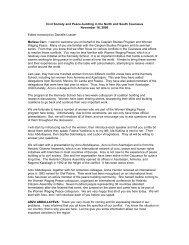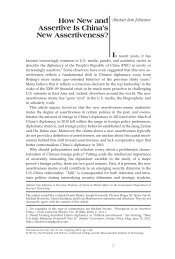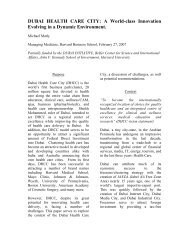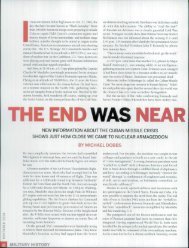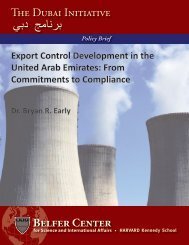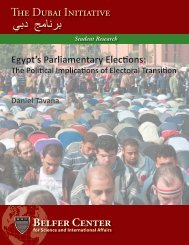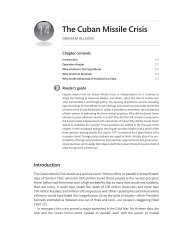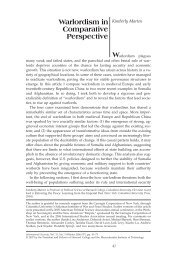Interim Storage of Spent Nuclear Fuel - Woods Hole Research Center
Interim Storage of Spent Nuclear Fuel - Woods Hole Research Center
Interim Storage of Spent Nuclear Fuel - Woods Hole Research Center
You also want an ePaper? Increase the reach of your titles
YUMPU automatically turns print PDFs into web optimized ePapers that Google loves.
22<br />
some 86,300 tonnes <strong>of</strong> spent fuel, or about $55/kgHM. 57<br />
Overseas transportation would in general be somewhat<br />
more expensive, while transportation within Japan, which<br />
is carried out using ships that have already been paid for<br />
and casks that are re-used, would be expected to be cheaper.<br />
Indeed, the projected transportation cost for a centralized<br />
dry cask storage facility in Japan presented in Table 2.1<br />
above, is extraordinarily low, amounting to roughly<br />
$7/kgHM—presumably because the transport ships, vehicles,<br />
and casks already exist, so only the additional operations<br />
costs need to be included.<br />
Of course, unique circumstances—including political<br />
circumstances—can affect the cost <strong>of</strong> transportation dramatically.<br />
In Germany, for example, 30,000 riot police were<br />
required to protect the first shipment <strong>of</strong> nuclear waste to<br />
the Gorleben site, at a cost <strong>of</strong> some $57 million for a modest<br />
amount <strong>of</strong> spent fuel. 58<br />
Political and Institutional Constraints<br />
on Transport<br />
As with interim storage, the most difficult and complex<br />
aspects <strong>of</strong> transportation <strong>of</strong> spent fuel are building public<br />
confidence and overcoming the political and institutional<br />
constraints. In the United States, for example, legislation to<br />
establish a centralized interim storage site, was met with<br />
considerable skepticism over the safety <strong>of</strong> the required shipments,<br />
and was quickly dubbed the “mobile Chernobyl” bill<br />
by critics—a technically nonsensical but politically effective<br />
bit <strong>of</strong> sloganeering. 59 There has also been substantial public<br />
concern and political opposition to international transports<br />
<strong>of</strong> various nuclear materials, such as the shipments<br />
between Japan and Europe. 60<br />
The political and institutional constraints on transportation<br />
are much more difficult and complex in the Unit-<br />
INTERIM STORAGE OF SPENT NUCLEAR FUEL<br />
ed States than in Japan, because <strong>of</strong> the long overland transport<br />
routes that are likely to be required in the United<br />
States. These routes pass through nearly every state, hundreds<br />
<strong>of</strong> local communities, and the lands <strong>of</strong> numerous sovereign<br />
Native American tribes. Each <strong>of</strong> these jurisdictions<br />
must be involved in preparation for a transport, emergency<br />
planning, and the like, and each may have its own reasons<br />
for opposing the transport. A huge complex <strong>of</strong> Federal<br />
agencies—the Department <strong>of</strong> Energy, the Department <strong>of</strong><br />
Transportation, the <strong>Nuclear</strong> Regulatory Commission, the<br />
Environmental Protection Agency, the Federal Emergency<br />
Management Agency, and more—share parts <strong>of</strong> the<br />
responsibility for ensuring the safety <strong>of</strong> transports <strong>of</strong><br />
nuclear material, and must be involved. The planning<br />
process for any particular shipment can take years, and the<br />
opportunities for opponents to intervene to stop a shipment<br />
from taking place are legion.<br />
In general, there has been greater success in addressing<br />
these concerns and building public support where there<br />
was an open and transparent process designed to build general<br />
agreement that the transport was necessary, and the<br />
alternative <strong>of</strong> the status quo without transportation was not<br />
acceptable. 61 Approaches to such processes are discussed in<br />
detail in Chapter 5.<br />
Current <strong>Storage</strong> Status: United States<br />
As <strong>of</strong> the end <strong>of</strong> 1998, just over 38,400 tHM <strong>of</strong> commercial<br />
spent fuel was in storage in the United States. Of that total,<br />
all but 755 tHM was stored at reactor sites, and all but 1,511<br />
tHM was in pool storage. 62<br />
The spent fuel cooling pools at over half <strong>of</strong> U.S. power<br />
reactors are currently over 50% full. Had the reactor operators<br />
relied only on their storage pools, several would<br />
57 See Report to Update Total System Life Cycle Cost Estimate for Site Recommendation/ License Application (Washington, DC:<br />
DOE, December 1999), p. 35.<br />
58 See O’Neill, “International <strong>Nuclear</strong> Waste Transportation,” op. cit.<br />
59 See, for example, <strong>Nuclear</strong> Information and Resource Service, “Why We Call It `Mobile Chernobyl,’” fact sheet, available<br />
at http://www.nirs.org/factsheets/whywecallitmobilechernobyl.htm<br />
60 O’Neill, “International <strong>Nuclear</strong> Waste Transportation,” op. cit.<br />
61 Ibid. The case <strong>of</strong> the U.S. Waste Isolation Pilot Plant (WIPP), where transportation was ultimately accepted after prolonged<br />
delays in opening the facility—and an extensive process <strong>of</strong> public discussion and <strong>of</strong> making provision for transparency<br />
in the shipments—is another example <strong>of</strong> this type <strong>of</strong> approach.<br />
62 “Detailed United States <strong>Spent</strong> <strong>Nuclear</strong> <strong>Fuel</strong> Data as <strong>of</strong> December 31, 1998,” available at http://www.eia.doe.gov/<br />
cneaf/nuclear/spent_fuel/ussnfdata.html.


